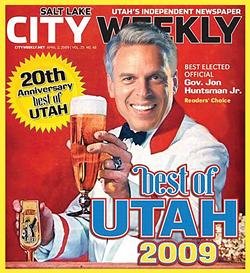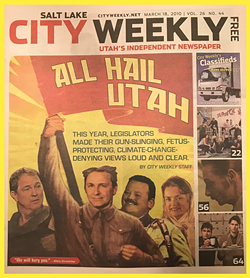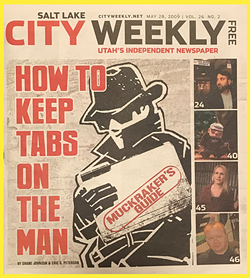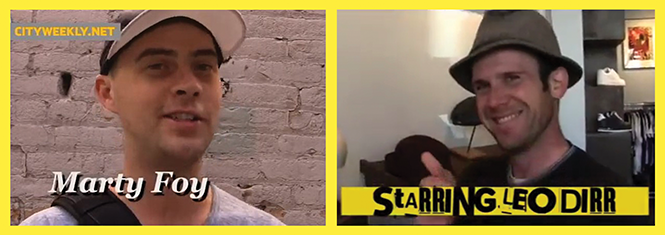"Today was bound to come," remarked the City Weekly staff in 2010. "After months of acting 'weird' and being 'constantly distracted' (by his own admission), City Weekly founder John Saltas has left the building. For good, it appears."
Such an end to an era hit many readers hard, but surprise grew to consternation when companion articles floated the notion of the Weekly being sold to local entities like The Church of Jesus Christ of Latter-day Saints. Curious emails and texts flowed into our offices with concern, hilarity and anger. The thing was, though, the aforementioned announcement had been made on April 1.
"No one connected to this April Fools' joke could have imagined the wide impact it had," Saltas subsequently wrote. "Even half our own office believed it, thanks to some well-placed Facebook updates and a circumstantial visit by an authentic CFO from Tennessee named Max. For those of you who were hurt or shocked by the notion that your Utah lifeline had been severed, all I can say is, 'Sorry,' but you gotta admit, that was a pretty good one!"
The CW family could use a bit of laughter. The paper was flourishing, but not much else seemed to be going too well. The economy was in decline, bitter and consequential debates waged around health care and banking reforms, and Gov. Jon Huntsman departed the state to become U.S. ambassador to China, leaving Lt. Gov. Gary Herbert to replace him in the governor's chair.
Herbert—a skeptic of climate change and marriage equality—was one of many right-wing hardliners to rise during this period, including Jason Chaffetz and Mike Lee. Their ascendency was bolstered amidst the backdrop of sophists like Glenn Beck and billionaire-funded "astroturf" movements like the Tea Party. Consequently, an even more strident variety of partisanship came into full flower, from freakouts over a banal speech made to schoolchildren by President Barack Obama, to hundreds of ATV riders illegally driving through a protected riverbed in the Grand Staircase-Escalante area.
Local efforts to establish independent commissions on political redistricting and ethics reform were both hampered by the high signature threshold required of citizen initiatives. One would be tempted to drink at such times and thankfully, local liquor options were expanding, however haltingly, with the death of the old private club laws.
Whether one's needs were related to the bottle or the ballot, City Weekly had it covered with Beer Crawl events and an open forum on citizen lobbying. Among the special issues released this year: a celebration of Utah's alternative pioneers was a standout; Shane Johnson and Eric Peterson wrote a guide to muckraking; and Stephen Dark reported on efforts to protect the Jordan River.
"Our readers have a sense of ownership of City Weekly that runs deeper than we knew," Saltas reflected. "We love Salt Lake City. We love you. And we're going to keep on being who we are—because, dammit, it's fun and it's serious and it's ever more fun. That's the City Weekly way."
And that is no joke.
In the videos
City Weekly was hitting the screens in a big way—not just because our logo made an unexpected cameo in the Oscar-winning short film Logorama. Taking advantage of burgeoning social media platforms, City Weekly's street team—composed of our valiant marketing staff—shot local interviews and events coverage to supplement the reporting our writers were producing elsewhere.
Another contributor to early efforts in video was Leo Dirr (1977-2018) with his series "Who the Hell?" Beginning in the summer of 2009 and running for more than 100 brief installments, Dirr encountered the "oddly interesting" denizens of Salt Lake.
From the baristas at Beans and Brews to the founder of My Dough Girl (later Ruby Snap Cookies), Dirr presented all with the same four questions: "Who the hell are you? What the hell are you doing? Why the hell are you doing that? Can I have a hug?"
"Leo was a really quirky dude," remembers Marty Foy—the producer of Dirr's series—who was himself another influential force in our early video efforts. Having started with the Weekly as a summer intern and sticking around for a time before moving to Colorado, Foy became the go-to person for videos on the strength of his minimal exposure in college classes.
"I was like a kid sitting at the big people table," Foy recalled in a recent interview. "They let any little weirdo come in and try something out. I never had so much fun."
Perhaps his greatest contribution was the weekly web show "Zionized," which centered on "local people doing local stuff." From Spanish lessons with the Always Learning Free Skool to following the Urban Iditarod and spotlighting Latin drag queens at El Paisa Grill, Foy covered a wide spectrum of people, events and experiences.
"Every once in a while, I get a little nostalgic," Foy said. He occasionally looks back at his work and groans over their quality. Still, he credits the experience as instrumental in developing the "figure-it-out" instincts that have served him well as director of marketing at Morrow. "It was the first experience where I was being treated seriously as an adult," he beamed.
In talks
"Mormons and non-Mormons alike were taken by surprise when on Nov. 10, The Church of Jesus Christ of Latter-day Saints officially pledged support for two Salt Lake City nondiscrimination ordinances," reported Jesse Fruhwirth on Nov. 19, 2009. "This was after a year in which gay-rights activists amplified their criticisms of the church's stance on homosexuality."
Fruhwirth confirmed that businessman Jim Dabakis had led a gay-rights delegation to meet with representatives of the church's public affairs department. Deeda Seed, a former Salt Lake City Council member who attended the emotional talks, wondered at the experience. "Just think about it," she told Fruhwirth, "Here they [LDS officials] are sitting down and talking with me and other folks, and I'm a person who organized a protest event in front of their church."
These were welcome developments in the estimation of such local activists as Jacob Whipple and Troy Williams, both of whom nevertheless remained ready to exert more pressure if the city ordinances proved to be a one-off thing or, worse, a publicity stunt.
"[Williams] believes the backlash the church has experienced since Prop. 8 prompted its support of the ordinances," Fruhwirth wrote. "That negative attention has included multiple protests, satirical plays like The Passion of Sister Dottie S. Dixon, which Williams co-wrote, and even a segment on The Colbert Report that focused on former City Weekly account manager Derek Jones and his partner, Matthew Aune, who were detained by church security for kissing on the Main Street Plaza."
Brandie Balkan noted that some effort came from within the faith community itself. "It's important to acknowledge that far beyond protests that occurred, beyond any press, I know there were private, earnest conversations that occurred in many, many homes," she said. "You could frame that as pressure, but in some ways, there's a much greater piece that is understanding."
Duane Jennings, then a member of the Mormon support group Affirmation, added that countless Mormons who wrote to church leaders or who disengaged from active participation had also had an effect. To Jennings, there was nothing shameful about progress and reform, even for a church.
"[Church leaders] want to pretend things are the same as 'yesterday and today and forever,'" he told Fruhwirth. " ... they forget God is the same 'yesterday and today and forever,' but the people on earth are continually progressing and improving."
Since Fruhwirth's article was published, the church has made additional calls for nondiscrimination ordinances, but also rolled out an ill-conceived (and short-lived) 2015 policy declaring members in same-sex marriages to be "apostates."
Progress is neither inevitable nor a straight line. As of this writing, it remains to be seen where this will all go next. Here's hoping the earnest conversations continue both privately as well as publicly.
More by Wes Long
-
40 Years of City Weekly—Volume 36: 2019 to 2020
City Weekly Rewind
- Apr 24, 2024
-
40 Years of City Weekly—Volume 35: 2018 to 2019
City Weekly Rewind
- Apr 17, 2024
-
Salt Lake's modern tree canopy is a living legacy of the peoples of Utah.
Life in the Slow Lane
- Apr 17, 2024
- More »









